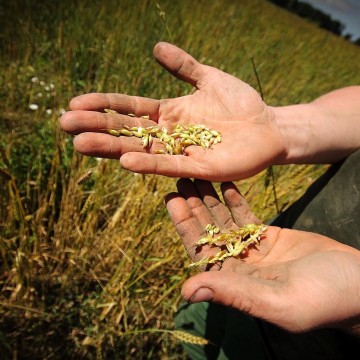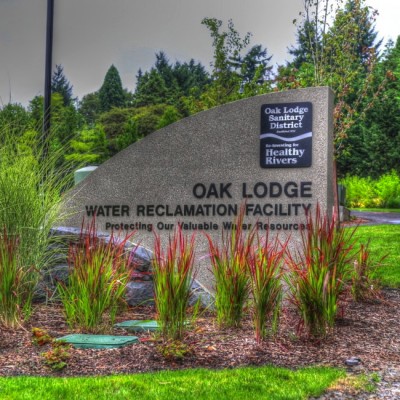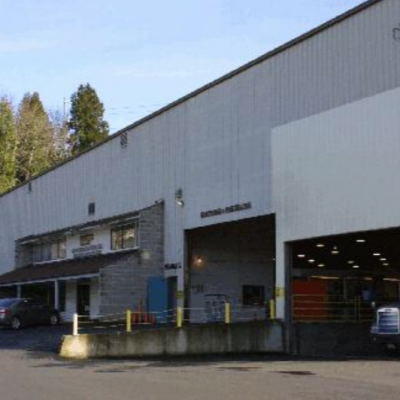The Financial Reality of “Sustainable Farming” in Oregon
Thursday, April 23, 2015

“The first two years our labor was pretty much unaccounted for,” said Leah Rodgers of Rockwood Urban Farm, who is in her third growing season. “This year I’m drawing a salary from the farm.”
Community-supported agriculture, which is one model typically used by small organic farms, has grown steadily in the last 25 years, though 2008 is the first year that the city of Portland did a survey. At the time only 19 farms responded.
Portland’s 2014 survey, which just came out this month, gathered information from 58 farm businesses, mostly vegetable farmers, though the CSA movement has also spread to meat and fish businesses. Together these businesses sold 5,824 “shares” or season memberships at a value of about $2.7 million. That averages to about $46,000 per farm, but if you think about it, that revenue must cover both farm expenses and salaries for CSA owners.
And for those starting out, the barriers to a living wage are pretty high. Rodgers and her partner Ryan Miller were both working full-time jobs when they started Rockwood behind their newly purchased home in East Portland. They had half an acre of land, and in 2013, they sold their first 14 shares to mostly friends. Their farm income just covered farm costs.
Rodgers is now in the process of ending her job as a grassroots organizer at the Friends of Family Farmers to focus on her own farm. But that’s after a couple of hard years building clientele and adding more land to their farm. Additionally, Miller, who cares for the gardens at McMenamin’s Kennedy School, will keep his job.
Last year Rockwood Urban Farm doubled its shareholders to 30 members and added two more acres in two separate locations.
One acre is through a farm incubator program with the East Multnomah Soil and Water Conservation District, which allows small farm businesses to lease land at Headwaters Farm near Gresham for a reduced price. Lease payments are only $150 the first year and graduate each year until they reach $600. Headwaters is a 60-acre farm, so Rockwood Urban Farm isn’t the only business working the land. Farmers share the equipment and infrastructure already on the farm, and the water is free as long as you do drip irrigation.
“It’s addressing a lot of barriers right away,” said Rodgers, though she added that the land is pretty degraded and in need of care.
They also began leasing an extra acre from a neighbor, but the costs are much higher—$4,100 annually.
Rodgers said she worked about 30-50 hours a week on the farm last season and between 32-38 hours at her nonprofit job. “I don’t recommend it. I saw the depths of my personality,” she said, “I was definitely over-worked and over-stressed.”
On top of that, Rockwood Urban Farm has other revenue streams besides the CSA that Rodgers manages. It also sells directly to restaurants in the Portland area, and Rodgers does floral design for weddings using flowers grown on the farm.
But it’s not just work for Rodgers, it’s a passion. “When I think about it, it’s what makes the most sense for me as an individual who wants to be a part of a conscientious society… I want to be of service to my community and my planet,” she said. “I feel like in some ways, I can be enslaved to the man or I can be enslaved to the land and I’m going to make the latter choice.”
Polly Gottesman, who farms Pumpkin Ridge Gardens with her husband James Just, was one of the trailblazers using the CSA model in the Portland area. This year will be their 26th season. “Our first subscription season was 1990. When we started there were two others in the Portland area,” she said.

“It’s definitely easier (now). It’s never been easy, though,” said Gottesman. “We both work full-time on the farm, and I don’t think we’ve ever made more than $25,000 each. We’re lucky enough not to have to have other jobs, but it’s not a middle class income.”
Pumpkin Ridge also employs two full-time year-round workers and one seasonal worker, paying them between $10-15 an hour.
“To me that’s economic success,” she said. “But that doesn’t mean that I don’t think farmers shouldn’t get paid more. In terms of our own income, it’s very difficult to say what would be fair.”
She counts the lifestyle as one of the benefits of farming, saying she values the opportunity to own her own land and eat seasonal vegetables that they’ve grown themselves. And even though summer hours are long and intense, there is some time off in the winter, she said. The lifestyle can’t really be enumerated.
The CSA model is partly meant to help farmers hedge against risk by giving them a working budget for the year. Instead of worrying over crop prices going up or down in a commodity market, CSA farmers already know what they’ll get paid. “By having people who commit to small farming, we are able to maintain small farms and farmland,” Gottesman said.
While some CSAs ask for payment up front at the beginning of the season—a requirement that can be a barrier for some customers—the practice is more important in the earlier years.
Rodgers said it was really important in their first year but that some investments can be spread out from season to season, whether its an irrigation system or perennial plants. She said she’s also mindful of customers that want to participate but are on a limited budget and will accept monthly payments from them.
Gottesman explained that Pumpkin Ridge just does monthly payments now. “Over time with better organization, we were able to front the seed order,” she said. In the past there had been years where they had no money for a season. For that reason, they prefer having money come in all year.
Though there are a few programs through the U.S. Department of Agriculture (USDA) for specialty crops grants, CSA farmers have generally lacked other policy support, which could ease other risks or help increase income.
Only recently has there been more acknowledgement from the government about the work of small farmers. A $60,000 USDA grant to the PACSAC is helping take care of some marketing and education outreach, which can be a challenge for farmers. This year, along with Ecotrust, the PACSAC held its first CSA fair meant to help customers find their farmer.






































 Delivered Free Every
Delivered Free Every
Follow us on Pinterest Google + Facebook Twitter See It Read It